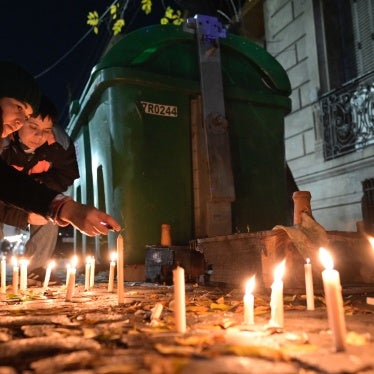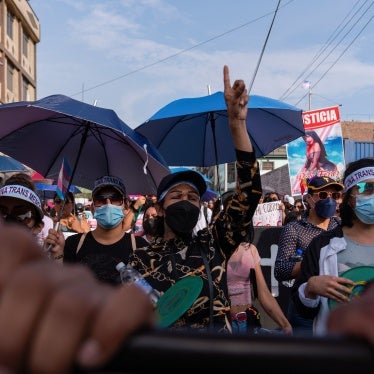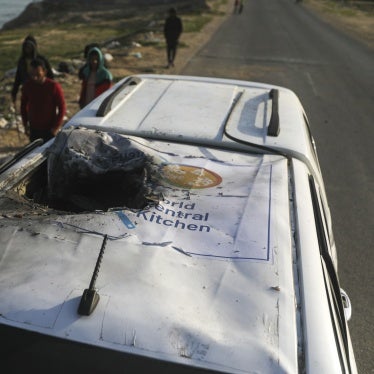Condoleezza Rice
Secretary of State
US Department of State
Washington, DC 20520
Dear Madam Secretary:
We are writing you in advance of the US assumption of the UN Security Council presidency this June to call your attention to the Sudanese government’s deliberate and ongoing defiance of Security Council resolutions aimed at protecting civilians and at providing accountability in Darfur. Given the gravity and magnitude of the Darfur crisis, we hope that your office will give this very serious matter your full consideration in the weeks ahead. Come June, we look to the US government to use its full power and authority as the Security Council president to send a strong signal to Khartoum that its persistent obstructionism will no longer be tolerated. We believe that this is fully consistent with the aspirations of the administration’s Darfur policy.
Since January 2008, Khartoum has carried out a series of attacks on civilians, including aerial bombardments of three West Darfur villages on a single day, February 8, which resulted in the deaths of hundreds of civilians. The bombardments utilized attack helicopters in violation of the ban on offensive military overflights imposed by the Security Council under resolution 1591. The aerial bombardments were supported by government-backed Janjaweed militia, underscoring Khartoum’s failure to disarm the Janjaweed in continuing violation of Security Council resolution 1556 of 2004.
The government of Sudan also persists in actively obstructing international efforts to protect civilians by creating countless barriers to the deployment of the United Nations-African Union peacekeeping force (UNAMID). As you know, the force is currently at only a third of its authorized strength. Contrary to resolution 1769, the government of Sudan significantly delayed assignment of land for use by UNAMID forces and concluding a Status of Forces Agreement. Khartoum also continues to refuse the deployment of non-African troops, despite the fact that there are no African units with the same capabilities who are ready to deploy.
The Sudanese government also openly flouts impunity for grave crimes in violation of international law committed in Darfur. In January, Musa Hilal, the notorious Janjaweed leader who is subject to both Security Council sanctions pursuant to resolution 1591 and to US sanctions for his role in Darfur’s atrocities, was recently given a special advisory position by President Omar Bashir. This appointment was strongly criticized by Ambassador Zalmay Khalilzad as showing Khartoum’s “contempt for the rule of law.” The government’s disregard for accountability was demonstrated again recently by the reported promotion of General Awad Ibn Auf, former head of Military Intelligence and Security, to Deputy Chief of the Joint Staff. General Auf had been placed on the US sanctions list in May 2007 for his role in the Darfur conflict.
Finally, in contravention of resolution 1593, by which the Security Council referred the Darfur situation to the International Criminal Court (ICC), Khartoum refuses to cooperate with the ICC. Nearly a year after the court’s issuance of arrest warrants, the first two suspects are still free. One, Ahmed Haroun, who is also the subject of US sanctions, remains State Minister for Humanitarian Affairs and is the government’s liaison to UNAMID. Haroun was also appointed to co-chair a committee designated to hear human rights complaints during Secretary-General Ban Ki-moon’s visit to Sudan last September. The other, Ali Kosheib, had been in national custody in relation to other charges at the time that the ICC warrants were issued, but was released from prison last October. The call on April 6 by Sudan’s UN Ambassador Abdel-Mahmood Mohamad to arrest and try ICC prosecutor Luis Moreno Ocampo further demonstrates Sudan’s open and ongoing defiance of the UN Security Council.
Darfur Special Envoy Richard Williamson stated this month that significant improvements in the security and humanitarian situation in Darfur are conditions precedent to the United States and Sudan restoring their official ties. While we do not believe that Sudan should be rewarded for fulfilling its binding legal obligations, the ongoing defiance of Security Council resolutions and US sanctions signals Khartoum’s confidence that it will not face any consequences for its actions. We look to the US government to lead in shaping a strong response to Sudan’s continuing attacks on civilians and its obstruction of UNAMID deployment.
Human Rights Watch also urges the US government to press Khartoum following the June 5 report to the Security Council by the ICC prosecutor. As president of the Council, the US should support the adoption of a resolution or a presidential statement criticizing Sudan’s continued non-compliance. We believe that anything short of a robust effort will further embolden the perpetrators of the Darfur crisis.
Human Rights Watch will be closely following the US presidency at the Security Council. In the months until June, we look forward to strong US action on Darfur.
Sincerely yours,
Richard Dicker
Director, International Justice Program
Tom Malinowski
Washington Advocacy Director
CC:
John D. Negroponte, Deputy Secretary
Zalmay Khalilzad, US Representative to the United Nations
Jendayi E. Frazer, Assistant Secretary for African Affairs
Kristen Lee Silverberg, Assistant Secretary for International Organization Affairs
James B. Warlick, Principal Deputy Assistant Secretary for International Organization Affairs
Grover Joseph Rees, Deputy Assistant Secretary for International Organization Affairs
David J. Kramer, Assistant Secretary for Democracy, Human Rights and Labor
Jonathan D. Farrar, Principal Deputy Assistant Secretary for Democracy, Human Rights and Labor
Jeffrey R. Krilla, Deputy Assistant Secretary for Democracy, Human Rights and Labor
Clint Williamson, Ambassador-at-Large for War Crimes Issues
Richard S. Williamson, Presidential Special Envoy for Sudan
Stephen J. Hadley, National Security Advisor






